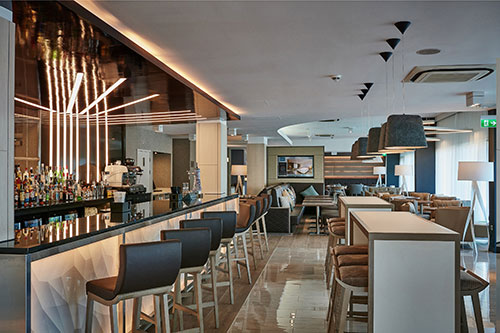How big is hospitality's skills shortage?
The Caterer's Think Again campaign, highlighting the fantastic opportunities in hospitality and encouraging employers to inspire young people, is back. In the first in a series of articles, David Harris asks: is the skills shortage worse now than ever before?
Getting good staff has always been a challenge for British hotels and restaurants. There are plenty of well trained, highly motivated people out there; it's just that there aren't enough of them. In one sense this is a positive thing: the industry is thriving so much that it needs more trained staff all the time. The skills gap is a classic case of demand outstripping supply.
Yet neither the skills problem nor the solutions to it have changed a great deal in more than a century. A hundred years ago London was already importing foreign waiters and chefs (back then, it was often Germans) because not enough locals could do the job well enough (see panel). Any analysis of the skills gap in hotels and restaurants needs to recognise that the gap has always existed; the business has never not had a skills shortage.
Efforts at keeping staff have been around for many years as well. More than 20 years ago, in 1994, The Caterer was able to report that staff turnover had more than halved since 1984, from 60% in 1980 to 27% in 1992. The figures came from a report by the Hotel & Catering Training Company (HCTC). But it was still one of the highest staff turnover rates compared with other industries.
Attraction and retention
Today, the scale of recruitment needed remains statistically staggering. People 1st, the sector's skills and workforce development charity, estimates that 1.3 million employees will have to be recruited by 2024, of whom 975,000 will be replacements for staff that have left. The difference between the two figures, roughly 325,000, represents the expected growth in business between now and then. This growth is a good thing, but the size of staff turnover is not.
Quite rightly, most businesses now concentrate their human resources efforts both on getting good staff in the first place and then keeping them once they have them.
For Moira Laird, human resources director at Best Employer Award Catey winner Valor Hospitality, which runs 20 hotels all over the UK, retention is vital. "We are obsessed by employee engagement, which is all about retention," she says. "Each hotel carries out employee engagement surveys and we really do act on those. We even like to get employees fully involved in our annual company forums."
In those surveys, Valor tries to ask open-ended questions such as "what would make you happier?" and "what's on your mind right now?" in an effort to encourage thoughtful responses rather than automatic answers.
Laird says that the company also tries to be helpful when its employees need it most, by providing time off during periods of bereavement or divorce, for example.
Laird adds that the staff comments have also taught her that wages, while important, are far from the only or even most important factor that makes people want to stay in a job.
She says: "It is very striking how many people say in the surveys that one of the things they like about their workplace is how supportive their colleagues and friends are. Job satisfaction is often about the people you work with."
The personal element really matters, believes Laird, and Valor underlines this by offering its 2,500 staff regular face-to-face 'coffee chats' with senior managers. This does not just bring emotional benefits. If staff stay longer, companies have time to train them, so they get better at what they do. In an ideal world, staff retention is a happy coincidence of benefits for both company and employees.
Moira Laird
A resilient sector
It is also true that despite the often bleak assessments of how short the supply of trained staff is or might become, many in the industry have great faith in its ability to adapt and overcome.
John Upton, the former McDonald's senior director who this year joined natural fast food chain Leon as managing director, asserts that for them there is no skills shortage. "It's true that it is a very competitive marketplace, but for us I don't think that there is a skills shortage. Of course we are no Le Gavroche, so the skills we need from our staff are a little different, but I think that even in the wider industry most will be OK," he says.
"Catering and hospitality is incredibly resilient and continues to defy all the naysayers. There may be some bumps in the road, but this industry will overcome them."
Just as with Valor, the human element is a key part of Leon's philosophy when it comes to keeping its staff. One of its company values is to 'be kind'. More practically, it doesn't just offer staff free lunches, but discounts for family and friends. Managers can also get healthcare packages.
Upton's upbeat view of hospitality is echoed by many others and the growth of the sector in recent years provides some of the most cheering news.
Peter Ducker, chief executive of the Institute of Hospitality (IoH), says: "In recent years, hospitality in the UK has been a huge success story and has experienced phenomenal growth. Our workforce increased by 13% between 2011 and 2015, according to People 1st, with the restaurant industry alone creating 120,000 new positions. This has had a particular impact on a number of roles, including chefs, which have increased by 49,000."
Figures like this give further context to the skills gap and underline that part of the reason for it is that, happily, business is growing. Ducker points out that IoH research has indicated that only 7.7% of hospitality graduates were unemployed six months after graduating. If you do a hospitality degree "you will get a job", he adds. The IoH views the next few years as an ideal time for the hospitality business to ditch its old image as "a career of last resort" and highlight its advantages.
At Leon the human element is a key part of its philosophy when it comes to keeping staff
Reaching out
The skills shortages still need to be addressed, however, and considerable efforts are being made to do so. Springboard, the industry charity, works hard to highlight a wide range of training opportunities in hospitality. Forthcoming events include National Waiters Day (20 October), which forms part of the inaugural Front of House Festival (17-21 October) and Mission Apprentice, which promotes apprenticeships in hospitality. There is even a programme (A Day To Sparkle) designed to promote careers in housekeeping.
For the particularly challenging issue of the chef shortage, Springboard runs FutureChef, which runs a four-stage national competition for those still at school to encourage them into a career. It has grown remarkably in recent years. In 2000 it involved just 127 pupils. Last year it had 8,239 participants.
Springboard chief executive Anne Pierce says: "FutureChef is playing a vital part in solving tomorrow's skills shortage. It relies on incredible support from professional chefs and colleges, but we need more support from chefs throughout the country to become mentors, tutors and judges. The ongoing support of the hospitality industry is vital in order to address the shortage it faces."
The Brexit spectre
It is impossible to talk about that shortage without looking at the implications of Brexit. Nearly a quarter of the hospitality and tourism workforce is made up of overseas workers, both from the EU and beyond. Will Brexit mean that this figure will come down? Nobody knows for sure. However, the fear is that if restrictions are introduced via a points-based system according to skills, it would not bode well for hospitality.
A People 1st paper published in September says: "This may make it extremely difficult for those businesses recruiting front of house staff, as they will not be considered sufficiently skilled to fall within any 'skilled' occupational list."
The other problem, adds People 1st, is that even if some occupations do meet the skilled criteria, such as chefs, the current restrictions for 'tier 2' occupations means that they will need to be paid at least £35,000 a year. The current average chef's salary, according to the Office for National Statistics, is under £18,000.
However, history suggests that if workers are really needed, ways tend to be found to get them here, as the pre-war German waiters did.
And whether staff are British or not, companies are definitely making more efforts to keep them. This is likely to become even more important with the National Living Wage, which is set to be at least £9 by 2020. Similarly, the apprenticeship levy is making businesses ever more careful to maximise the benefit of their contributions. It is an example of just the sort of industry resilience referred to by Upton. The sector seems to be able to adapt and survive, however hard politics or circumstances contrive to make its life.
Valor Hospitality places great emphasis on job satisfaction
Eternal issues?
In 2014, Professor Panikos Panayi of De Montfort University and Dr Stefan Manz of Aston University published a paper on Germans in the UK catering market from 1880-1920 (The Rise and Fall of Germans in the British Hospitality Industry 1880-1920).
One of the reasons that German waiters and chefs were here was familiar: there were certain roles that could not be filled by Brits because they didn't have the skills.
Panayi and Manz pointed out that in 1911, about 10% of waiting staff in London were German. The co-authors wrote: "The German waiter was a trope and a familiar sight for British restaurant-goers, just as east-central Europeans or post-colonial Asian migrants are today."
As early as 1890, The Victualling Trades' Review praised German waiters as "both thoroughly conversant with their business and [having] had a rigorous training and wide experience".
Other reasons for the German presence might also resonate with the industry nowadays. "German waiters had various advantages compared with native Britons. Before 1914 the former laboured up to 15 hours a day. In contrast to Englishmen, who demanded a fixed wage, foreigners relied upon tips, from which they could make £2 per week."
The wages have gone up a lot since then, and not so many of the foreign staff are German. But how much have things changed otherwise? Surely it should be no surprise that employers are keen on staff who work long and hard for wages that they can afford to pay.
Continue reading
You need to be a premium member to view this. Subscribe from just 99p per week.
Already subscribed? Log In













